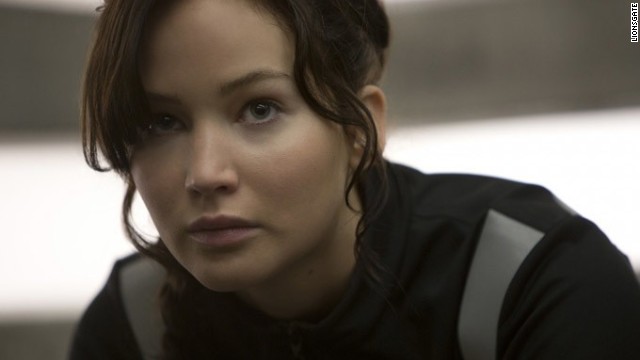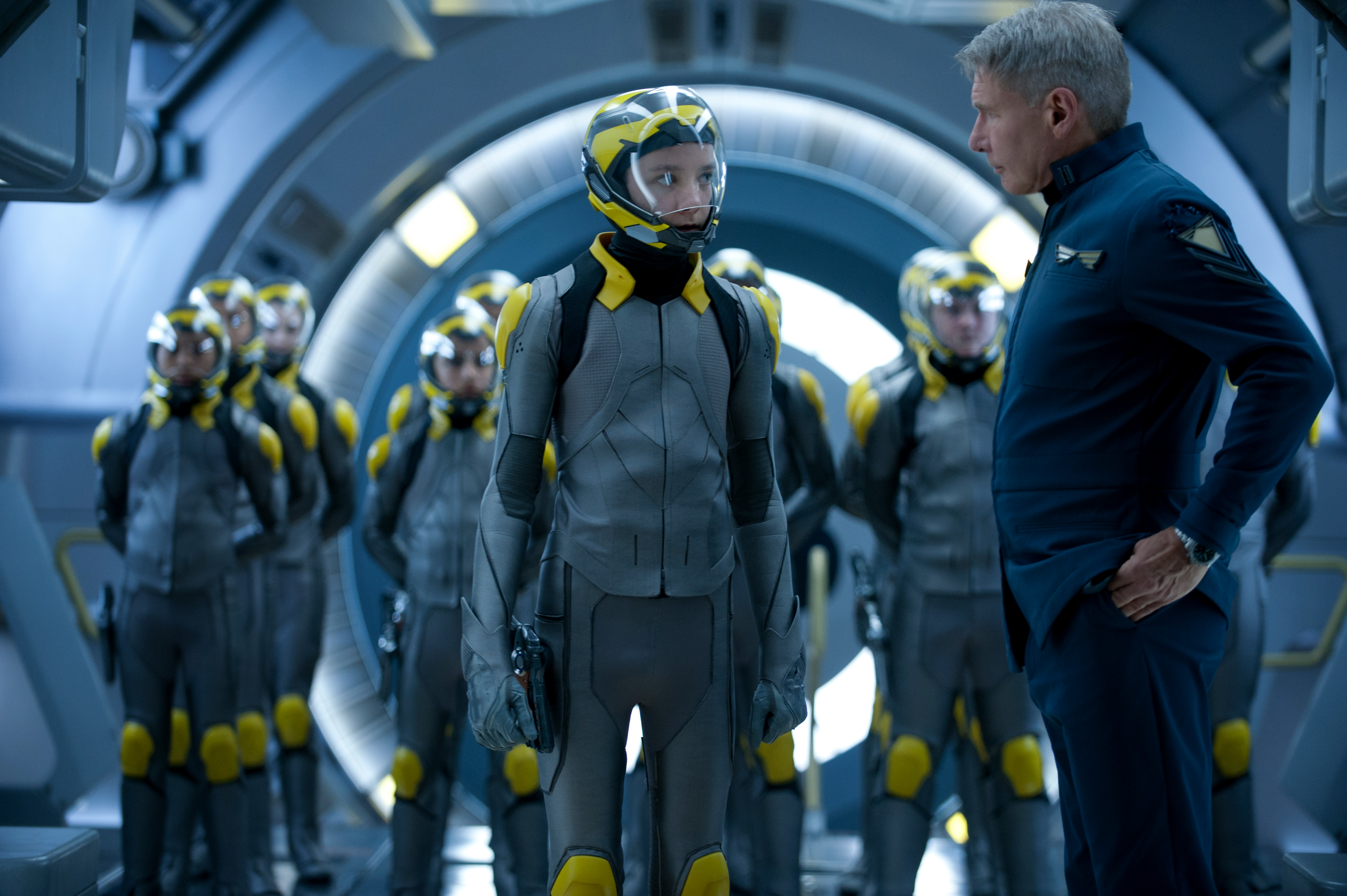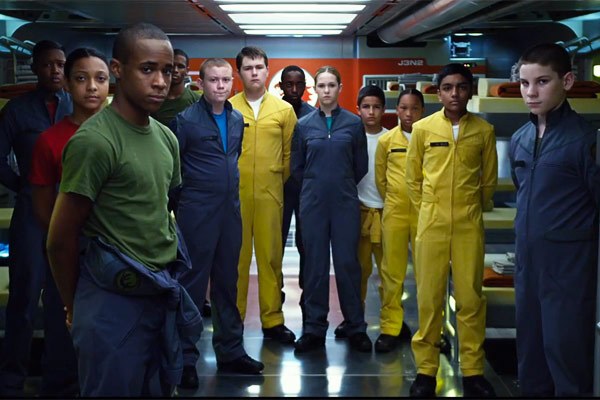There have been a couple of threes lately--Iron Man 3 happened this summer. The Chronicles of Narnia got around to three before it sputtered and went out. Harry Potter got us to eight, somehow. The Dark Knight Rises brought us to three for the new Batman franchise. But we haven't seen trilogies as a thing since Star Wars and The Lord of the Rings.

About an hour into The Hunger Games: Catching Fire, I realized that I was in the middle of one for the first time in years, and I started to think about the whole thing differently. By the end, I was convinced that we were looking at a pretty darn good one.
Trilogies are a tough business but they make a gorgeous structural challenge, with beautiful potential. Look at the Star Wars films--if we only had a sequel, we would get Hoth but not Endor, Yoda but not Jabba. If The Lord of the Rings ended with The Two Towers, we would explore Rohan but not Gondor, Theoden but not Denethor. A trilogy gives a chance to explore deeply the world we have already met once, and to change our relationships with things we thought we understood.

Gosh, am I getting emotional? So Catching Fire starts us in an unspecified amount of time after the first film, when Katniss Everdeen (Jennifer Lawrence) and Peeta Malark (Josh Hutcherson) jointly won a yearly massacre funded by the Capital of Pan Am to appease and distract the starving inhabitants of its Twelve Districts. In order to win, Katniss and Peeta staged a sort of on-screen love affair that the world got attached to. Katniss did it against her judgment, as she still had some sorta feelings for Gale back home, but Peeta from all accounts seems to reciprocate.
Katniss is a tough protagonist this time around. At first glance, she seems weak. Katniss is still haunted by the murders she committed the previous year, and Gale (whose only apparent virtue is being Liam Hemsworth) is still haunted by all the smackers she laid on Shorty McBreadmaka. And of course, like any self-respecting pseudo-boyfriend, he stays mopey about it for the entire movie. Still, Ms. Lawrence's Katniss is still the most kick-butt heroine we've seen on screen for a while. The middle installment of the trilogy shows a near-manic side of her, but the things we value her for (her love of her family, her self-sacrifice, and her prowess as a fighter) remain unchanged.
She seems weak, however, because she rarely makes decisions or follows clear objectives. To her credit, Ms. Lawrence is not afraid of contorting her face in anguish, grief, or fury, but Katniss is even more accidental of a heroine this time than she was last time. When attacked by a frightening sound of her sister being tortured, she curls up into a ball, showing no nerve. When helping a wounded woman, she can do little else but give her a watered cloth and say "That should help" and run away. At first this bothered me, but I think it's somewhat necessary. In order for Katniss to come into her own as a powerful figure in the third film, she must go through a time of weakness here.

The film's story is surprisingly elaborate and surprisingly long, and both of these surprises thrilled me. In an age where good stories are being compressed for movie-munching mindless audiences who can't sit still for two and a half hours, Francis Lawrence and company take their time, and it pays off. Catching Fire, while full of heart-pounding action sequences, interesting characters, and an epic story, takes enough time to balance it with quiet moments of conversation, character development, and feeling.
Numerous characters stand out, and one of the film's strength is that all of them mean something to us by the end. From Donald Sutherland's difficult tyrant President Snow to Jena Malone's elevator-stripping, f-word shouting Johanna Mason, portraits in Catching Fire always come three-dimensionally. The film doesn't let us write off characters as bad, self-centered, or stupid. Of particular note: Finnick Odair (Sam Claflin), an arrogant-rival-turned-friend, shimmers with complexity. Mr. Claflin balances shirtless shallow-boy with selfless caretaker, and his journey for the audience is an achievement by the whole team. Plutarch Heavensbee, the enigmatic new Gamemaker, is clearly important because he is played by Phillip Seymour Hoffman, but even the Great PSH manages to live in the world of the Hunger Games believably and with the proper weight.

But the real star of the film is Mr. Hutcherson's Peeta Malark. In an early scene with Katniss on a train, he admits "I don't really know you. Friends tell each other the deep stuff." "Like what?" she replies. "What's your favorite color?" he asks. "Now, that's going too far," she answers. I connected with Peeta because in a world where any sort of normalcy or friendship seems impossible, Peeta is trying to make things work. Where Katniss often stands by, mouth contorted by fear or pain or wrath, and does nothing, Peeta steps in. He makes bold moves. He tries to help people, even as they are dying in his hands.
This might come from his need to be loved. Everyone loves Katniss, but Peeta admits "Nobody needs me". It's the same old unrequited love story, but Peeta gets the credit that is due to many unrequited lovers--they fight for what they want. He is made even more heroic by Haymitch's description of him to Katniss: "You could live a thousand lifetimes and not deserve him." In yet another stroke of subtlety, the film doesn't let us love people simply because they are handsome or romantice--it asks to question why we do.
Like a good trilogy, Catching Fire lets us look at the characters and the story through a new lens. The political commentary is never terribly deep and the moral lessons are surprisingly shallow for such a twisted story, but the characters make it worth seeing and experiencing. It asks us to question our American-Idol style celebrity worship and asks us why we follow people, why we believe in other people. This is still young adult literature, but rarely is such material treated with this kind of respect.









